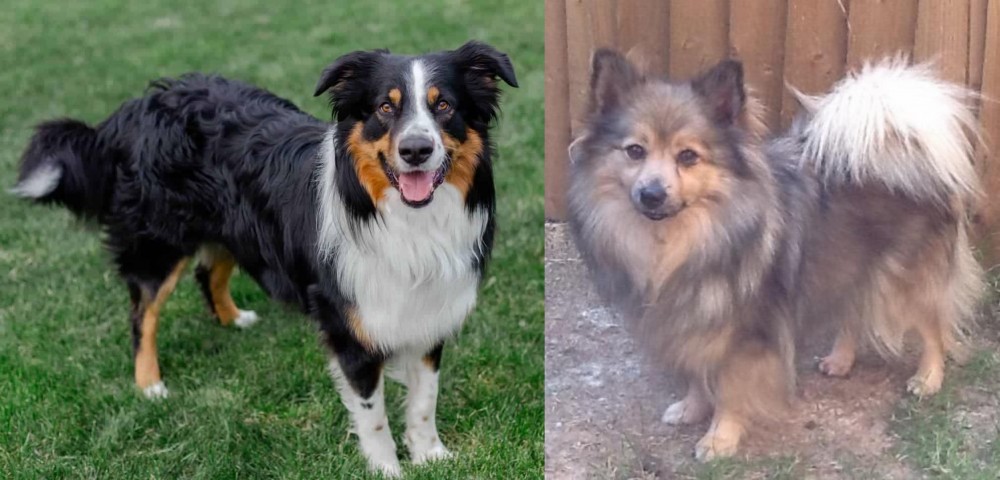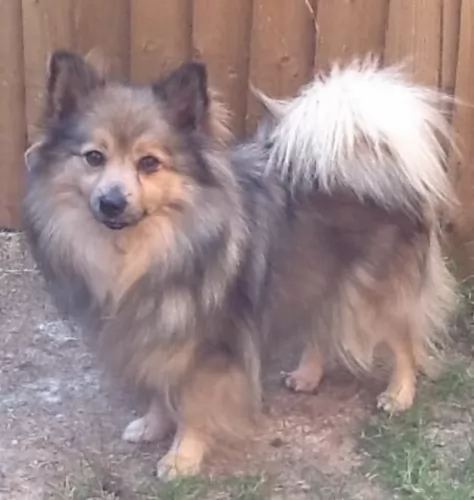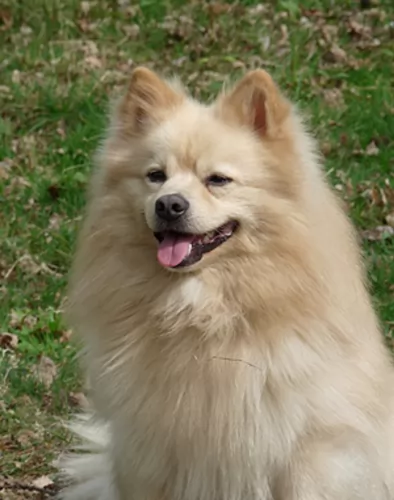 Petzlover
Petzlover English Shepherd is originated from United States but German Spitz (Mittel) is originated from Germany. English Shepherd may grow 20 cm / 8 inches higher than German Spitz (Mittel). English Shepherd may weigh 17 kg / 38 pounds more than German Spitz (Mittel). Both English Shepherd and German Spitz (Mittel) has same life span. English Shepherd may have more litter size than German Spitz (Mittel). English Shepherd requires Low Maintenance. But German Spitz (Mittel) requires Moderate Maintenance
English Shepherd is originated from United States but German Spitz (Mittel) is originated from Germany. English Shepherd may grow 20 cm / 8 inches higher than German Spitz (Mittel). English Shepherd may weigh 17 kg / 38 pounds more than German Spitz (Mittel). Both English Shepherd and German Spitz (Mittel) has same life span. English Shepherd may have more litter size than German Spitz (Mittel). English Shepherd requires Low Maintenance. But German Spitz (Mittel) requires Moderate Maintenance
 The English Shepherd is another dog with an English name that was developed in the United States. They developed from British farm dogs that were brought to the United States in the 17th, 18th and 19th centuries by the Scottish and English as they settled in the New World. Tracing their line through working dogs and collies in Scotland and northern England, the settlers bred them with local dogs and each other. These working farm dogs were called English Shepherds, Scotch Collies, barnyard collie, farm shepherd, the cow dog, and the old fashioned shepherd.
The English Shepherd is another dog with an English name that was developed in the United States. They developed from British farm dogs that were brought to the United States in the 17th, 18th and 19th centuries by the Scottish and English as they settled in the New World. Tracing their line through working dogs and collies in Scotland and northern England, the settlers bred them with local dogs and each other. These working farm dogs were called English Shepherds, Scotch Collies, barnyard collie, farm shepherd, the cow dog, and the old fashioned shepherd.
The English Shepherd was appreciated by the settlers and farmers because he was a versatile dog that could herd their flocks and protect their homes as well. They appreciated his intelligence and ability to hunt vermin and be a companion for their children. English Shepherds were bred to work with a variety of livestock such as pigs, cattle, goats, sheep and fowl. They were used to hunt as well and were known to track racoons and squirrels and tree them. There wasn’t a more popular dog in the American Midwest and East in the 1800’s and 1900’s.
The breed is trustworthy, alert and independent. As the small family farms were replaced by large agricultural enterprises the English Shepherd’s numbers dwindled as well until he fell into the category of a rare breed. There were no clubs to support it and not AKC recognition. The UKC had a different dog registered as a farm shepherd.
Today’s English Shepherd is still a farm dog, but he also hunts, is a therapy dog, competes in AKC trials, and performs search and rescue duties. As a farm dog, they are still the most desirable due to their versatility in working with different livestock, guarding the home and caring for the children. They do these things in a gentle way if possible but can be tough if needed. They have great empathy for the livestock and for their human family. This makes him a great dog for the family. The English Shepherd has remained a farm dog, working dog more than a show dog, over all these years.
 Originating in Germany, the German Spitz Mittel is an alert, vigilant dog and it is these qualities that made him sought after for working on farms.
Originating in Germany, the German Spitz Mittel is an alert, vigilant dog and it is these qualities that made him sought after for working on farms.
He is no new breed and is the 3rd largest of the five German Spitz varieties. It is believed that the German Spitz descended from the Northern sled and herding dogs which arrived with the Vikings into Europe. When you do research you see that the dogs are mentioned in German literature which dates way back to to 1450 already.
 The American bred English Shepherd is a medium sized dog that looks somewhat like an Australian Shepherd or Border Collie. They have tails, never come in merle coloring and their head is not as rounded as the Australian Shepherd. A working dog, its proportionally very well balanced. Because the English Shepherd is so popular across the country, doing a wide variety of jobs, there is some regional differences in the dogs.
The American bred English Shepherd is a medium sized dog that looks somewhat like an Australian Shepherd or Border Collie. They have tails, never come in merle coloring and their head is not as rounded as the Australian Shepherd. A working dog, its proportionally very well balanced. Because the English Shepherd is so popular across the country, doing a wide variety of jobs, there is some regional differences in the dogs.
The coat can be curly or straight with feathering around the tail, ears and legs. Their heads are slightly rounded but broad and the muzzle is also broad with a solid black nose except for the clear sable dogs whose nose is brown. The eyes show you how intelligent and strong this breed is, and they should be round, brown and oblique. The ears are close to the head and wide apart.
With a strong, muscular back and shoulders the English Shepherd can do almost anything you ask him to. His legs are strong and straight, and his hind legs are muscular. His feet are compact, oval and well padded.
 The German Spitz Mittel is similar in looks to the other sizes of German Spitz. The Mittel is a medium sized dog and stands between 30 and 38cm in height and weighs between 7 and 11kg. You’ll find him in solid colors such as tan, liver, white, fawn, black or a mix of these colors.
The German Spitz Mittel is similar in looks to the other sizes of German Spitz. The Mittel is a medium sized dog and stands between 30 and 38cm in height and weighs between 7 and 11kg. You’ll find him in solid colors such as tan, liver, white, fawn, black or a mix of these colors.
He has a soft woolly undercoat and a long outercoat with a mane-like ruff at the neck. He has a fairly long muzzle, dark eyes, sharp erect ears and a bushy tail which curls over his back.
Affectionate, faithful, and always happy by nature, the German Spitz Mittel is a family companion that wants to be part of everything his human family is up to. He makes a good watchdog. He is alert and has a distrust of strangers.
He gets on well with children in the home and he can also live in peace with other dogs. Because he is an intelligent dog, you won’t have much trouble with training- and socializing him, although he will require a firm, consistent owner and trainer.
Training and socialization are important as there are always some important commands such as sit, stay, come and lie down that you will want him to respond to immediately.
 It may seem strange to talk about kindness in a working dog, but it is one of the defining traits of the English Shepherd, along with intelligence. The breed is extremely kind to everyone he lives with animals and people. Once he is secure in his job and takes in his children or his herd, he is one of the best caretakers around. He is an independent thinker, is easily trained, and highly affectionate. However, he does see himself as the boss and unless you establish yourself in that alpha role you could have problems.
It may seem strange to talk about kindness in a working dog, but it is one of the defining traits of the English Shepherd, along with intelligence. The breed is extremely kind to everyone he lives with animals and people. Once he is secure in his job and takes in his children or his herd, he is one of the best caretakers around. He is an independent thinker, is easily trained, and highly affectionate. However, he does see himself as the boss and unless you establish yourself in that alpha role you could have problems.
 People who have owned a German Spitz Mittel are delighted with him, saying that he is such an easy-going, happy dog. He is social and thrives on the interaction he has with his human family.
People who have owned a German Spitz Mittel are delighted with him, saying that he is such an easy-going, happy dog. He is social and thrives on the interaction he has with his human family.
He won’t do well if you simply put him in your backyard and forget about him, using him merely as a watchdog.
The German Spitz Mittel dog is one dog that definitely lives up to the title of man’s best friend. He is social, happy, loving, loyal, playful, entertaining and smart too, and when you treat him the way he deserves, you’ve got the most awesome friend.
 Like many other herding breeds, it has been found that about 15% of English Shepherds had a gene mutation called MDR1. This means they have adverse reaction and high sensitivity to many common drugs for dogs. This condition could be life-threatening so test your dog for it and know what you are up against.
Like many other herding breeds, it has been found that about 15% of English Shepherds had a gene mutation called MDR1. This means they have adverse reaction and high sensitivity to many common drugs for dogs. This condition could be life-threatening so test your dog for it and know what you are up against.
 German Spitz dogs are healthy, and when you shower him with love and attention and good food, you can expect to have him around for up to 15 years of age.
German Spitz dogs are healthy, and when you shower him with love and attention and good food, you can expect to have him around for up to 15 years of age.
Of course, as with any other healthy dog breeds, there are always one or two common dog illnesses that your dog may get. These include hip dysplasia and eye diseases. If you notice symptoms that indicate possible joint issues with your pet, get him to the vet immediately.
Patellar Luxation for instance occurs when your dog’s kneecap is dislocated. It is more common in toy breeds like the German Spitz. It can be painful for your pet and lead to lameness. If your dog has problems with his hip, it can actually force the patella out of its groove, which is a secondary condition.
 Remember the English Shepherd is a hard working dog. But if you don’t work him don’t overfeed him. Twice a day, he needs about one half cup of a good quality dry food made with an active, medium sized dog in mind.
Remember the English Shepherd is a hard working dog. But if you don’t work him don’t overfeed him. Twice a day, he needs about one half cup of a good quality dry food made with an active, medium sized dog in mind.
In addition to the health concern listed above, the English Shepherd is also prone to:
Both elbow and hip dysplasia can plaque the English Shepherd as it does almost any active breed. Have your puppy tested as it can cause lameness and arthritis.
This is a herding breed and they need exercise. They need a job. They are intelligent and work oriented so make sure they have something to do. Take them to herding trails and have their herding instinct tested. Put them to work in flyball, agility, frisbee, tracking, obedience, rally, herding and showmanship events. Just make sure your English Shepherd has enough to keep his mind and body stimulated at a high rate every day.
 You can help reduce loose hairs with your German Spitz by brushing his thick coat twice a week. It’s a good time to also inspect your dog for ticks and fleas.
You can help reduce loose hairs with your German Spitz by brushing his thick coat twice a week. It’s a good time to also inspect your dog for ticks and fleas.
Your German Spitz Mittel isn’t the most active dog, but he will still need regular exercise. Going on a walk is good for both you and him. He is a mentally sharp dog too and these walks keep him both physically- and mentally fit. He also loves ball games.
Every dog deserves the best food, and if you feed your German Spitz Mittel with a commercially manufactured dog food, make sure its one of the top quality ones. You want to avoid foods packed with preservatives, colorants and fillers. You want dog foods with minerals and vitamins with high protein and ingredients such as Omega 3 and 6 to promote health skin.
There are also some dog foods which have ingredients in them such as polyphosphates. Ingredients like this keep your dog’s teeth clean.
Try and also give him some cooked rice, vegetables and chicken mixed into his kibble from time to time as well as raw meat. He should never be without fresh, cool water.